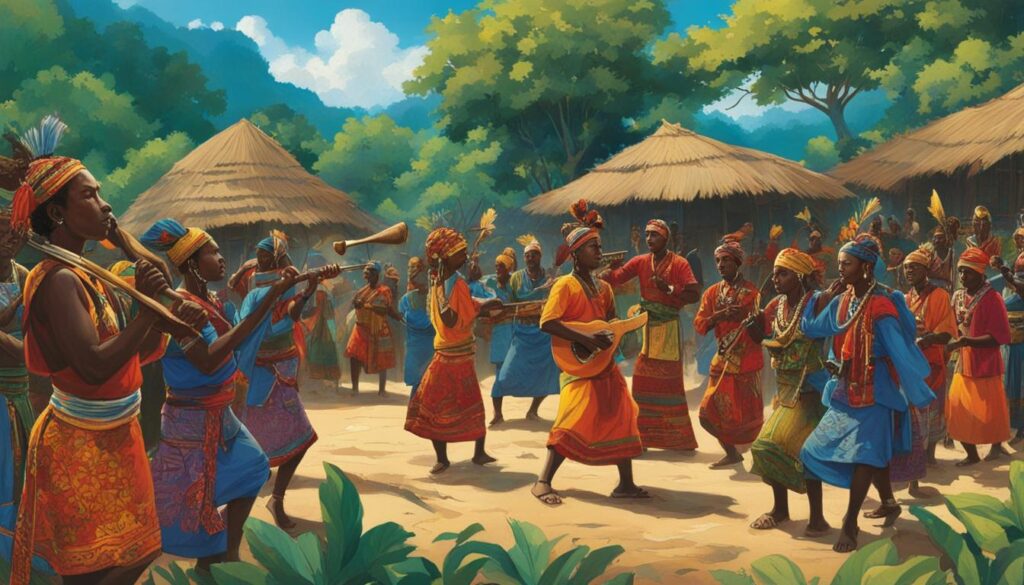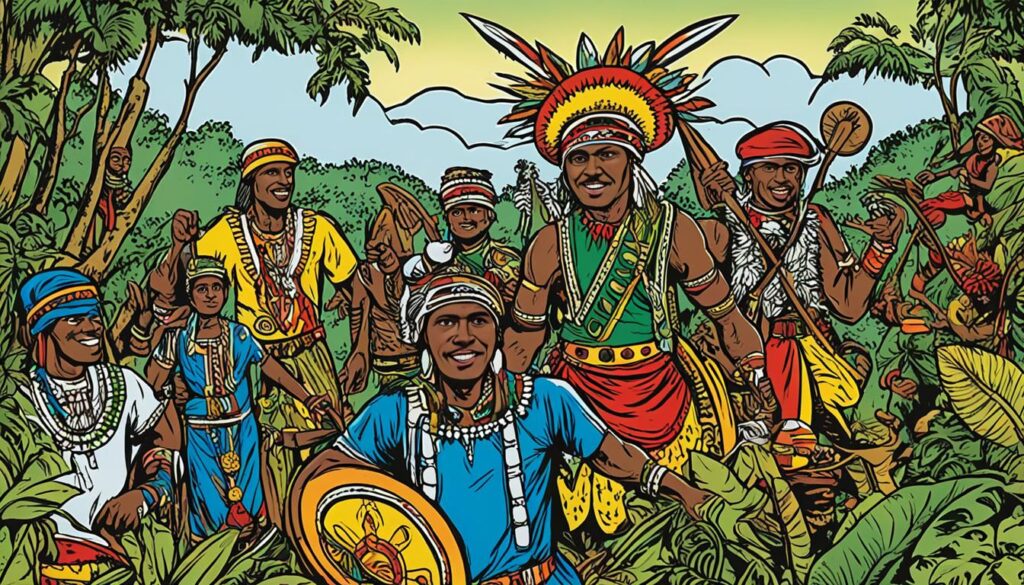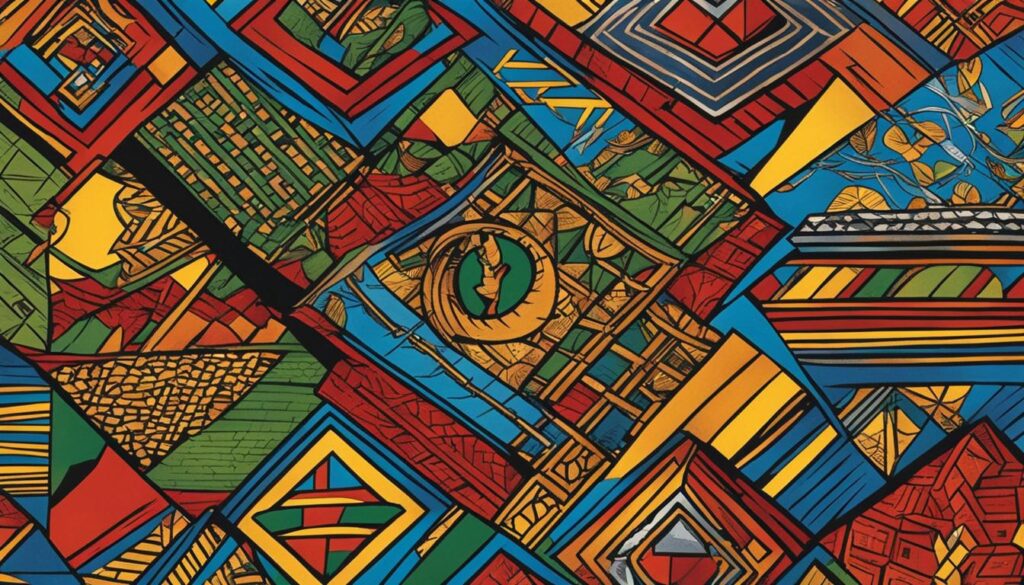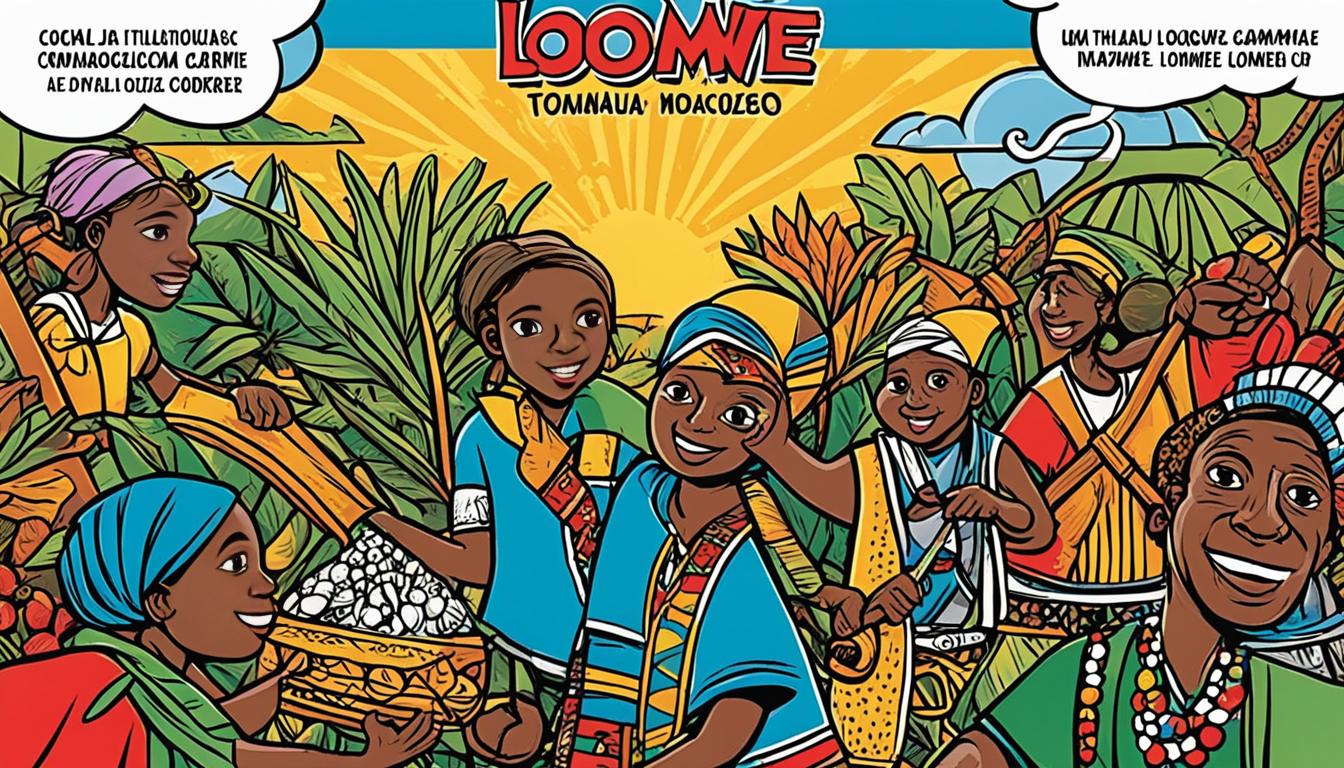Lomwe Language: Mozambique
Did you know that the Lomwe language, also known as Western Makua, is the fourth-largest language in Mozambique? With its rich history and cultural significance, the Lomwe language holds a special place within the Lomwe tribe and community. Let’s delve into the linguistic characteristics, cultural identity, and challenges faced by the Lomwe people as they strive to preserve their language and heritage.
Linguistic Characteristics of Lomwe Language
The Lomwe language is a Bantu language that falls under the Niger-Congo language family. As a tonal language, Lomwe uses tonal variations to distinguish different meanings. It exhibits a contrast between high-toned syllables and toneless ones, contributing to its unique melodic quality.
Within the Lomwe language, there are various dialects and variations. In Mozambique, the Ngulu (Mihavane) dialect is spoken by a specific Lomwe community. In Malawi, the Malawian Lomwe dialect is prevalent among Lomwe speakers. These dialects add further diversity to the Lomwe language.
Additionally, many Lomwe people in Malawi are bilingual, speaking both Lomwe and Chichewa. Chichewa is one of Malawi’s national languages and has influenced the linguistic landscape, impacting the choice of language among Lomwe individuals.
Tonal Characteristics of Lomwe Language
“The tonal nature of the Lomwe language allows for nuanced communication and expression. The strategic use of tones enhances the clarity and meaning of words, contributing to effective interpersonal communication within the Lomwe community.”
Dialects of Lomwe Language
The following table highlights the dialects present within the Lomwe language:
| Dialect | Location |
|---|---|
| Ngulu (Mihavane) | Mozambique |
| Malawian Lomwe | Malawi |
The image above depicts the vibrant linguistic diversity within the Lomwe language community.
Lomwe Language in Mozambique
In Mozambique, the Lomwe language is known as Elomwe and is predominantly spoken in the Zambezia Province. The Lomwe people belong to the larger Makhuwa-Lomwe Group, which constitutes a significant portion of the country’s population.
The Lomwe language, referred to as Elomwe in Mozambique, holds immense cultural significance for the Lomwe community. It serves as a vital means of communication and plays a crucial role in their day-to-day lives.
The Makhuwa-Lomwe Group is a diverse community that embodies the unique heritage and traditions of the Lomwe people in Mozambique. Efforts have been made to preserve and promote the Lomwe language and culture, acknowledging their significance in preserving the rich cultural fabric of the community.
Cultural preservation initiatives, including the establishment of cultural organizations, have been instrumental in safeguarding and celebrating the Lomwe language and its associated customs. Additionally, the language is utilized in official broadcasts, further emphasizing its importance and fostering its preservation among future generations.
| Makhuwa-Lomwe Group | Elomwe Language | Cultural Preservation |
|---|---|---|
| Zambezia Province | Lomwe language (Elomwe) | Cultural organizations |
| Significant population | Preservation efforts | Use in official broadcasts |
Quote:
“The Lomwe language is a crucial element of our cultural heritage, representing the rich traditions and customs that define the Lomwe people in Mozambique. Through concerted preservation efforts, we ensure the longevity of our language and the preservation of our identity.”

The image above visually represents the cultural importance of the Lomwe language in Mozambique, capturing the essence of the Lomwe community’s heritage and linguistic heritage.
Lomwe Language in Malawi
In Malawi, the Lomwe language is known as Chilomwe and is primarily spoken in the southeastern region of the country.
However, there has been a gradual language shift away from the Lomwe language, with many Lomwe speakers adopting Chichewa (also known as Chewa or Nyanja) as their primary language.
This language shift is influenced by various factors, including cultural assimilation and the prevalence of Chichewa as a national language.
Chilomwe, as a variant of the Lomwe language, holds significant importance for the Lomwe speakers in Malawi. However, the gradual shift towards Chichewa poses challenges to the preservation and vitality of the Lomwe language.
While cultural assimilation plays a role in this language shift, the influence of Chichewa as a widely recognized national language has contributed to the adoption of Chichewa by Lomwe speakers.
Despite these challenges, efforts are being made to promote the preservation of Chilomwe as a means to maintain the cultural heritage of the Lomwe community in Malawi.
“Language is not just a means of communication; it is also a carrier of culture. By preserving Chilomwe, we can ensure the preservation of our rich Lomwe cultural heritage.”
In order to highlight the language shift and the cultural assimilation among Lomwe speakers in Malawi, let’s take a look at the following table:
| Lomwe Language | Chilomwe | Chichewa |
|---|---|---|
| Lomwe Speakers | Decreasing | Increasing |
| Language Shift | From Lomwe to Chilomwe and Chichewa | N/A |
| Cultural Assimilation | High | Low |
The table above illustrates the decrease in Lomwe speakers and the increasing dominance of Chichewa in Malawi.
This language shift reflects the impact of cultural assimilation, as Lomwe speakers embrace the use of Chilomwe and Chichewa, further contributing to the decline of Lomwe as a primary language in the region.
Despite these challenges, it is crucial to recognize the significance of language preservation in maintaining the cultural identity and diversity of the Lomwe community.
In the next section, we will explore the relationship between the Lomwe language and cultural identity, shedding light on the role it plays in the customs, traditions, and belief systems of the Lomwe people.
Lomwe Language and Cultural Identity
The Lomwe language holds a profound significance in shaping the cultural identity of the Lomwe people. It serves as a key vehicle through which their traditions, customs, and beliefs are preserved and transmitted across generations. The Lomwe community takes pride in their rich cultural heritage, which is deeply intertwined with the language they speak.
Many Lomwe individuals adhere to traditional African religions, where ancestral spirits are revered and worshipped. These spiritual beliefs and practices are deeply rooted in Lomwe culture, highlighting the strong connection between the Lomwe people and their ancestral heritage. However, it is important to note that Christianity and Islam have also gained prominence within the Lomwe community, leading to a significant number of Lomwe individuals identifying as Christians or Muslims.
Throughout history, the Lomwe language has served as a powerful tool for preserving their cultural identity and reinforcing a sense of community. Its use in rituals, ceremonies, and everyday communication reflects the integral role of language in shaping and maintaining cultural traditions. The Lomwe people understand that language is not merely a means of communication but a vessel that carries their cultural values, knowledge, and worldview.
“Language is not merely a means of communication but a vessel that carries their cultural values, knowledge, and worldview.”
The Lomwe language enables the preservation of unique cultural practices, including storytelling, music, dance, and art, which further strengthen the bonds between Lomwe individuals and their cultural heritage. Moreover, through the Lomwe language, older generations impart traditional wisdom and ancestral teachings to younger members, fostering a profound sense of belonging and identity.
However, it is essential to recognize the complexity of cultural identity within the Lomwe community. As contemporary influences and globalization take hold, there may be shifts in cultural practices and beliefs. Some individuals may adopt elements of Christianity or Islam while still preserving certain traditional customs, creating a blend of cultural influences that shape their personal and collective identities.
In summary, the Lomwe language serves as the bedrock of the Lomwe people’s cultural identity, woven into their traditions, customs, and spiritual beliefs. It acts as a unifying force, connecting Lomwe individuals to their ancestral heritage and fostering a sense of belonging within the community.

Lomwe Language and Education
Education plays a vital role in shaping individuals and communities, providing opportunities for growth and development. However, when it comes to the Lomwe language, education faces certain challenges due to factors such as language shift and limited resources. As a result, the literacy rate among Lomwe speakers, particularly in rural areas, tends to be generally low.
The Lomwe community experiences a language shift towards Chichewa, one of the national languages of Malawi. This shift influences the educational landscape, as many Lomwe children are unable to receive education in their mother tongue, the Lomwe language. The lack of educational resources available in the Lomwe language further exacerbates this situation.
To address these challenges, the Malawian government has implemented language policies to promote education and literacy among ethnic minority groups, including the Lomwe community. These policies aim to ensure equal access to education and create an inclusive learning environment that recognizes and values linguistic diversity.
Efforts are being made to develop educational materials and curricula in the Lomwe language, facilitating the teaching and learning process for Lomwe students. These initiatives promote the preservation of the language and cultural heritage while fostering a sense of identity and belonging among Lomwe speakers.
Importance of Bilingual Education
Bilingual education can play a crucial role in empowering Lomwe children, allowing them to develop proficiency in both the Lomwe language and the dominant language in their region, such as Chichewa. Bilingual programs can help bridge the gap between the students’ home language and the language used in formal education, ensuring better educational outcomes and improved literacy rates.
By incorporating the Lomwe language into the education system, students can maintain their cultural identity, strengthen their sense of belonging, and have increased access to educational opportunities. Bilingualism also equips individuals with valuable language skills that can contribute to their personal and professional lives.
The Way Forward
As Lomwe-language education continues to evolve, it is crucial to focus on the development and implementation of effective language policies and strategies. These efforts should include:
- Collaboration between government institutions, educators, and community organizations to ensure the availability of adequate resources for Lomwe-language education.
- Professional development programs for teachers to enhance their skills in teaching the Lomwe language and implementing bilingual education practices.
- Increased awareness and advocacy for the importance of preserving and promoting the Lomwe language and culture.
By prioritizing the educational needs of Lomwe children and embracing linguistic diversity, we can foster an inclusive society that values and celebrates the Lomwe language and its rich cultural heritage.
| Educational Challenges | Language Policy Solutions |
|---|---|
| The literacy rate among Lomwe speakers, particularly in rural areas, is generally low. | The Malawian government has implemented language policies to promote education and literacy among ethnic minority groups, including the Lomwe community. |
| Language shift towards Chichewa affects the availability of Lomwe-language education. | Efforts are being made to develop educational materials and curricula in the Lomwe language. |
| Limited resources for Lomwe-language education hinder its accessibility and quality. | Collaboration between government institutions, educators, and community organizations to ensure the availability of adequate resources. |
Challenges and Opportunities for Lomwe Language
The Lomwe language, like many native languages around the world, faces various challenges that pose a threat to its preservation and vitality. One significant challenge is the language shift experienced by Lomwe speakers, particularly in Malawi, where the dominance of Chichewa has led to a decrease in Lomwe language usage. This shift has resulted in limited resources for education and literacy in the Lomwe language, which further hinders its preservation efforts.
Despite these challenges, there are opportunities for the Lomwe language to thrive and be revitalized. Community-led initiatives play a crucial role in preserving and promoting the language. By actively involving the Lomwe community in language preservation efforts, such as language documentation, linguistic research, and the development of educational materials, the Lomwe language can be safeguarded for future generations.
Cultural organizations also provide platforms for the use and promotion of the Lomwe language. These organizations facilitate cultural events, language classes, and storytelling sessions, creating spaces where Lomwe speakers can immerse themselves in their linguistic and cultural heritage.
Bilingualism is another key opportunity for the preservation of the Lomwe language. By promoting bilingual education and encouraging Lomwe speakers to maintain and use their language alongside dominant languages like Chichewa, the Lomwe community can retain their cultural identity and linguistic diversity.
Language is not merely a means of communication but a reflection of one’s cultural heritage, history, and identity. Preserving the Lomwe language is vital for the overall cultural well-being and diversity of the Lomwe community.
In conclusion, while the Lomwe language faces challenges such as language shift and limited resources, there are opportunities for its preservation and revitalization. Through community involvement, cultural organizations, and the promotion of bilingualism, the Lomwe language can continue to thrive as an integral part of the Lomwe people’s cultural heritage.
Challenges and Opportunities for the Lomwe Language
| Challenges | Opportunities |
|---|---|
| Language shift towards dominant languages like Chichewa | Community-led initiatives for language preservation |
| Limited resources for education in the Lomwe language | Use of the Lomwe language in cultural organizations |
| Decreased usage of the Lomwe language among younger generations | Promotion of bilingualism among Lomwe speakers |

Conclusion
The Lomwe language holds immense importance in the cultural heritage of the Lomwe community in Mozambique and Malawi. Despite facing challenges, concerted efforts are being made to preserve and promote this language, ensuring its continued significance and vitality within the community.
Language diversity plays a crucial role in our global cultural heritage, and the Lomwe language contributes to the linguistic richness and diversity of both Mozambique and Malawi. By embracing and celebrating the Lomwe language, we are preserving an integral part of our collective identity and fostering a deeper appreciation for language diversity.
It is essential to recognize the value of the Lomwe language and support initiatives that aim to safeguard its future. By providing educational resources, promoting bilingualism, and creating avenues for cultural exchange and expression, we can ensure that the Lomwe language thrives and continues to be a vibrant voice in our linguistic landscape.
FAQ
What is the Lomwe language?
The Lomwe language, also known as Western Makua, is the fourth-largest language in Mozambique. It belongs to the Makua-Lomwe Group of Bantu languages and is spoken primarily in the northern part of the country.
Are there different dialects of the Lomwe language?
Yes, there are variations and dialects within the Lomwe language, such as Ngulu (Mihavane) in Mozambique and Malawian Lomwe in Malawi.
Where is the Lomwe language spoken in Mozambique?
The Lomwe language, known as Elomwe, is primarily spoken in the Zambezia Province of Mozambique. The Lomwe people are part of the larger Makhuwa-Lomwe Group, which makes up a significant portion of the population in Mozambique.
Is the Lomwe language spoken in Malawi?
Yes, the Lomwe language, known as Chilomwe, is spoken primarily in the southeastern region of Malawi.
What is the cultural significance of the Lomwe language for the Lomwe people?
The Lomwe language plays a crucial role in the cultural identity of the Lomwe people. It is deeply connected to their traditions, customs, and beliefs.
Do most Lomwe people speak English or other languages?
Many Lomwe people also speak Chichewa, which is one of the national languages of Malawi. In Mozambique, Lomwe speakers may also have some proficiency in Portuguese.
Do Lomwe children receive education in their mother tongue?
Due to the language shift towards languages like Chichewa and limited educational resources in the Lomwe language, many Lomwe children do not receive education in their mother tongue.
What challenges does the Lomwe language face?
The Lomwe language faces challenges such as language shift, limited resources for education and literacy, and the dominance of other languages like Chichewa.
Are there efforts to preserve the Lomwe language?
Yes, there are efforts being made to preserve and promote the Lomwe language, including community-led initiatives, the establishment of cultural organizations, and the promotion of bilingualism among Lomwe speakers.
